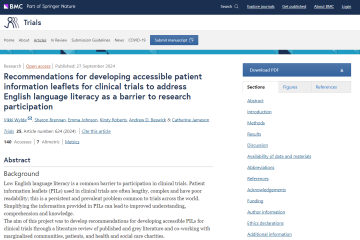Making trials more accessible through better patient information leaflets
Theme Surgical and orthopaedic innovation
Workstream Interventions to improve patient outcomes after surgery
Status: This project is complete
Clinical trials are research projects that compare different treatments to see which one is best. People who are asked to take part in clinical trials are often given written information about the trial first. This information usually comes as a leaflet telling someone everything they need to know before they decide whether they would like to take part in a trial.
Information leaflets for trials should be easy for everyone to understand, but often end up long and complex. Because of this, people with low literacy levels in English may choose not to take part in a trial because the information is not made easy enough to understand. They might also end up being excluded from taking part in the trial because we need to be sure they fully understand what they are signing up for.
Creating a more visual and easy-to-read patient information leaflet could remove a barrier to taking part in research and allow for more diversity among participants.

Project aims
Our aim was to work with community groups, patient groups, and health and social care charities to co-produce recommendations for developing easy-to-read patient information leaflets for use in early and later phase clinical trials.
What we did
We reviewed previous research on the topic.
We also met with
- two minority ethnic community groups
- two groups involving autistic adults and/or adults with learning difficulties
- a patient advisory group
We shared and discussed the content and format of accessible patient information leaflets during these meetings and asked for suggestions on how to change and improve them.
National Voices, a coalition of health and social care charities in England, held a national online workshop with charities and lived experience partners.
The workshop focused on reviewing barriers to participation and asked participants to identify:
- key information researchers would need to include in an accessible format
- solutions and approaches to ensure the proposed output meets the needs of people who are underrepresented in current research
What we found and what this means
We co-developed a framework of 74 recommendations aimed at designing accessible patient information leaflets for clinical trials. The recommendations are divided into five topics:
- formatting – left-align text and use bullet points; format text and images into two columns; make headings easily distinguishable; print on low-to-no gloss paper; select wider typefaces in a large font size; avoid underlining, italics, and only use bold for emphasis
- information presentation – present information in a logical order; focus on one message at a time; consider summaries and keep the volume of information short; avoid repetition
- writing style – use familiar, appropriate and inclusive phrasing; write in clear, plain language; avoid jargon, abbreviations and acronyms; test for readability using online tools
- content – provide a brief overview of the trial and avoid using too many logos; explain the purpose of the trial and clearly describe eligibility criteria, the trial process, treatment allocation, standard care, potential advantages and disadvantages, and side effects
- accessibility – translate the leaflet into different languages and provide information on other formats such as braille, large print, plain text, audio or video with voiceover or subtitles
These recommendations provide a preliminary framework to support the development of accessible patient information leaflets.
What next
We will use the recommendations from the MAPLE project and work together with members of the public, patients, marginalised community groups and IT experts to make an online platform. This platform will help researchers to make visual, inclusive and accessible patients information leaflets for clinical trials.
By creating this platform to help researchers make better patient information leaflets, we hope to help make it easier for patients with low English literacy to take part in clinical trials and get better diversity in those people who take part. This would mean that clinical trials of the future will better represent the people who live in the UK.
